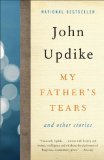Summary | Excerpt | Reviews | Beyond the Book | Readalikes | Genres & Themes | Author Bio

Critics' Opinion:
Readers' Opinion:
First Published:
Jun 2009, 304 pages
Paperback:
May 2010, 336 pages
 Book Reviewed by:
Book Reviewed by:
Natasha Vargas-Cooper
Buy This Book
Morocco
The seacoast road went smoothly up and down, but compared with an American highway it was eerily empty. Other cars appeared menacing on it, approaching like bullets, straddling the center strip. Along the roadside, alone in all that sunswept space, little girls in multicolored Berber costume held out bouquets of flowers—violets? poppies?—which we were afraid to stop and accept. What were we afraid of? A trap. Bandits. Undertipping, or overtipping. Not knowing enough French, and no Arabic or Berber. “Don’t stop, Daddy, don’t!” was the cry; and it was true, when we did stop at markets, interested persons out of the local landscape would gather about our rented Renault, peering in and offering unintelligible invitations.
We were an American family living in England in 1969 and had come to Morocco naïvely thinking it would be, in April, as absolute an escape to the sun as a trip to the Caribbean from the Eastern United States would be at the same time of year.
But Restinga, where a British travel agency as innocent as we of climatic realities had sent us, was deserted and windy. The hotel, freshly built by decree of the progressive, tourism-minded king, was semicircular in shape. At night, doors in the curving corridors slammed, and a solitary guard in a burnoose kept watch over the vacant rooms and the strange family of pre-season Americans. By day, the waves were too choppy to swim in, and the Mediterranean was not so much wine-dark as oil-black. Walking along the beach, we picked up tar on our feet. When we lay down on the beach, wind blew sand into our ears. Off in the distance, apartment buildings of pink concrete were slowly being assembled, and there were signs that in a month vacationers from somewhere would fill the bleak plazas, the boarded-up arcades. But for now there was only the whipping wind, a useless sun, and—singly, idly, silently in the middle distance—Arabs. Or were they Berbers? Dark men, at any rate, in robes, who frightened our baby, Genevieve. Fantastic as it seems now, when she is so tall and lovely in her spangled disco dress, she was then overweight and eight. Caleb was ten, Mark twelve, and Judith a budding fourteen.
“Je le regrette beaucoup,” I told the manager of the Restinga hotel, a blue-sweatered young man who wandered about closing doors that had blown open, “mais il faut que nous partirons. Trop de vent, et pas de bain de la mer.”
“Trop de vent,” he agreed, laughing, as if reassured that we were not as crazy as we had seemed.
“Les enfants sont malheureux, aussi ma femme. Je regrette beaucoup de partir. L’hôtel, c’est beau, en été.” I should have used the subjunctive or the future tense, and stopped trying to explain.
The manager gave our departure his stoical blessing but explained, in cascades of financial French, why he could not refund the money we had prepaid in London. So I was left with a little cash, a Hertz credit card, four children, a wife, and plane tickets that bound us to ten more days in Morocco.
We took a bus to Tangier. We stood beside an empty road at noon, six stray Americans, chunky and vulnerable in our woolly English clothes with our suitcases full of continental sun togs bought at Lilywhite’s and of Penguins for vacation reading. The sun beat upon us, and the wind. The road dissolved at either end in a pink shimmer. “I can’t believe this,” my wife said. “I could cry.”
“Don’t panic the kids,” I said. “What else can we do?” I asked. “There are no taxis. We have no money.”
“There must be something,” she said. Somehow, my mem- ory of the moment has dressed her in a highly unflattering navy-blue beret.
“I’m scared,” Genevieve announced, clutching her knapsack and looking painfully hot and rosy in her heavy gray overcoat.
Excerpted from My Father's Tears and Other Stories by John Updike Copyright © 2009 by John Updike. Excerpted by permission of Knopf, a division of Random House, Inc. All rights reserved. No part of this excerpt may be reproduced or reprinted without permission in writing from the publisher.





The Funeral Cryer by Wenyan Lu
Debut novelist Wenyan Lu brings us this witty yet profound story about one woman's midlife reawakening in contemporary rural China.
Your guide toexceptional books
BookBrowse seeks out and recommends the best in contemporary fiction and nonfiction—books that not only engage and entertain but also deepen our understanding of ourselves and the world around us.